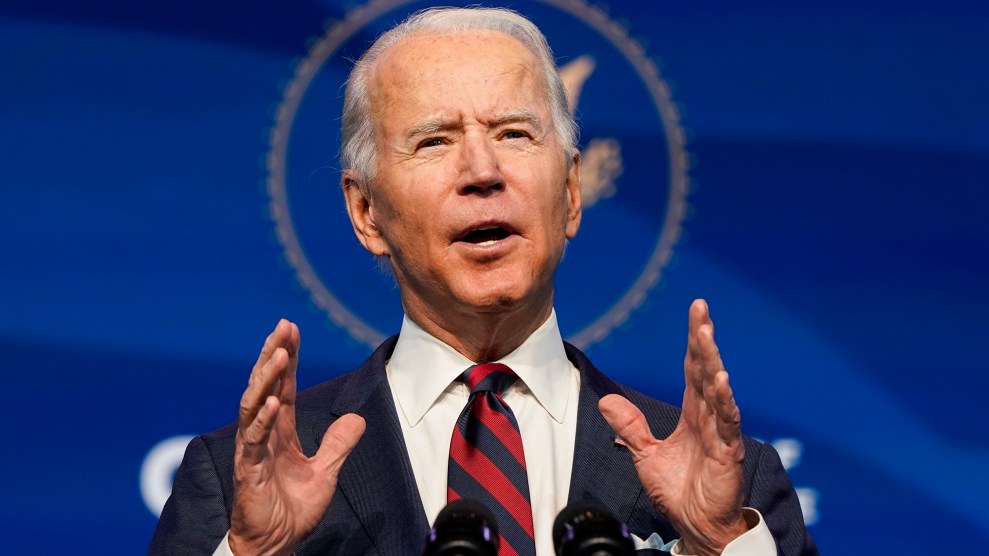
Michael Regan at his February nomination hearing in Washington, DC. Caroline Brehman/ZUMA
This story was originally published by HuffPost and is reproduced here as part of the Climate Desk collaboration.
The Senate on Wednesday confirmed Michael Regan as the nation’s 16th Environmental Protection Agency administrator, tasking the former North Carolina regulator with rebuilding a rule-making body that saw scientists and staffers leave by the hundreds under the Trump administration.
Regan, 44, the first Black man to run the agency in its 50-year history, was confirmed with support from every Democrat and 16 Republicans, ultimately securing his job with a 66-to-34 vote.
He takes the reins at a historic turning point, where class and race are increasingly understood as corollaries to how much disease-causing pollution Americans face throughout their lives.
A vast team of Cabinet officials responsible for dealing with climate policy will likely be welcomed help. Regan faces an agency reeling from four years of upheaval. Compared to the start of 2017, the EPA’s payroll was nearly 900 employees shorter by the time former President Donald Trump left office in January.
The EPA served as the spear tip of the Republican president’s pro-polluter policy agenda. The administration’s first EPA chief, Scott Pruitt, was a close ally of the gas industry who previously led lawsuits to block Obama’s policies to curb climate-changing emissions from power plants. After Pruitt resigned in disgrace amid mounting scandals, Andrew Wheeler, who until mid-2017 worked as a lobbyist for a top coal company, took over.
Under Trump’s rule, the EPA gutted environmental regulations by the droves. At a moment when science was starting to show the deadly cumulative effects of air pollutants, the administration sought to limit the epidemiological science regulators could use to draft new public health safeguards, even as a deadly respiratory disease spread into a historic pandemic.
Regan, an expert in air pollution, will face the dual challenge of creating new rules to curb how many tiny particles—which new research shows kill children and threaten brain health—make it into the air, but also roll back measures the Trump administration put in place to impede future regulators from considering that science.
He will also play a key role in shaping domestic climate policy, and will likely pursue new rules limiting pollution from automobiles and power plants as two of his first major regulatory pushes.
The new administration’s government-wide approach to the emissions crisis will likely elevate the EPA administrator. Yet, in what may be a sign of the partisan tone of criticism to come, Regan has already had to fend off attacks from Republicans questioning how much power he’ll have compared to McCarthy, a claim that right-wing trolls first lobbed to dismiss the nominee as a diversity hire.
“Where the decisions are in EPA’s purview, I can assure you that I will be leading and making those decisions, and I will be accepting the accountability for those decisions,” Regan said at the February hearing when GOP senators echoed the right-wing talking point.
Regan’s experience in a conservative-leaning swing state served him well throughout the confirmation process, signaling that he would seek to depoliticize the agency and work in good faith with partisan opponents. In February, four Republicans on the Senate Environment and Public Works Committee—Sens. Kevin Cramer of North Dakota, Lindsey Graham of South Carolina, Dan Sullivan of Alaska and Roger Wicker of Mississippi—approved Regan’s nomination, advancing him to the full chamber by a 14-to-6 margin.
Regan even scored a surprise Republican vote Wednesday night when Sen. Marco Rubio (R-Fla.), who had voted with much of his party against ending debate on the EPA nomination an hour earlier, switched his position and offered the 16th Republican yea.
A native of Goldsboro, North Carolina, Regan has a record on environmental issues that stretches back two decades.
He worked on the EPA’s air quality and energy programs in the Bill Clinton and George W. Bush administrations before joining the Environmental Defense Fund, where he led the politically moderate advocacy group’s efforts to reduce the effects of climate change and air pollution. In 2017, North Carolina Gov. Roy Cooper tapped him to lead the Department of Environmental Quality, overseeing a budget of roughly $80 million.
Regan’s tenure as North Carolina’s head environmental regulator was mixed. He created the Clean Energy Plan, mandating the state’s utilities to cut their output of climate-changing gases to 70 percent below 2005 levels by 2030 and setting a goal to reach net-zero emissions by 2050.
In January 2020, he negotiated the largest coal-ash removal settlement in US history, compelling utility giant Duke Energy to excavate nearly 80 million tons of a toxic residue that often pollutes water sources and soil.
Last August, Regan rejected a key water permit for the Mountain Valley Pipeline, a controversial natural gas project, calling it “an unnecessary project that poses unnecessary risks to our environment.”
But that came two years after he greenlighted permits for the Atlantic Coast Pipeline, a separate gas project that drew fierce opposition from faith groups, environmentalists and community activists, particularly those in Black communities along its proposed route. He also approved a gas facility in the heart of Lumbee territory, the largest Indigenous tribe east of the Mississippi, without properly consulting tribal leaders.
Under his leadership, the state agency “approved every permit application from the wood pellet industry in North Carolina despite the industry’s massive deforestation problems and failed to resolve critical environmental issues related to hog waste disposal,” according to a blog post from the Center for Economic and Policy Research’s Revolving Door Project, a watchdog group.
Advocates in the Tar Heel State described him as hamstrung by the state legislature’s Republican majority, who routinely punished his agency with budget cuts. The budget shrank 34 percent from 2008 to 2018, and it lost 376 staff positions, research from the nonprofit Environmental Integrity Project found last year. And for Regan’s first two years in office, Republicans held a veto-proof majority in the legislature.
“He’s a good person, and I think he has the heart to do right by communities and do right by the environment in this state,” Naeema Muhammad, the organizing co-director of the North Carolina Environmental Justice Network, told HuffPost when Regan was nominated in December. “But his hands have been tied up by our legislature.”
The American Petroleum Institute, the nation’s most powerful oil and gas lobby, said it looked “forward to working with Administrator Regan to build on the nation’s strong environmental progress while ensuring access to affordable, reliable and cleaner energy safely produced here in the United States.”
Under the Biden administration, which has vowed to direct 40 percent of all climate efforts toward historically disadvantaged communities, Regan will enjoy a broad mandate to address pollution inequities. It’s a daunting crisis.
People living below the poverty line breathe air with 1.35 times more particulate matter than the overall population, according to a landmark EPA study published in April 2018. For non-white Americans, that number was 1.28 times higher. For Black Americans, specifically, that figure surged to 1.54 times higher than the overall population.
A report by the NAACP found Black Americans were exposed to 38 percent more polluted air than their white countrymen, and were 75 percent more likely to live in communities abutting polluting industrial facilities than the average American.
“I’m hopeful he will give environmental justice voices a new and stronger platform in the EPA,” Kathleen Rest, the executive director of the Union of Concerned Scientists, said in a statement. “The next administrator has a host of big tasks ahead, and we look forward to working with Mr. Regan to ensure the EPA agency lives up to the challenge.”











